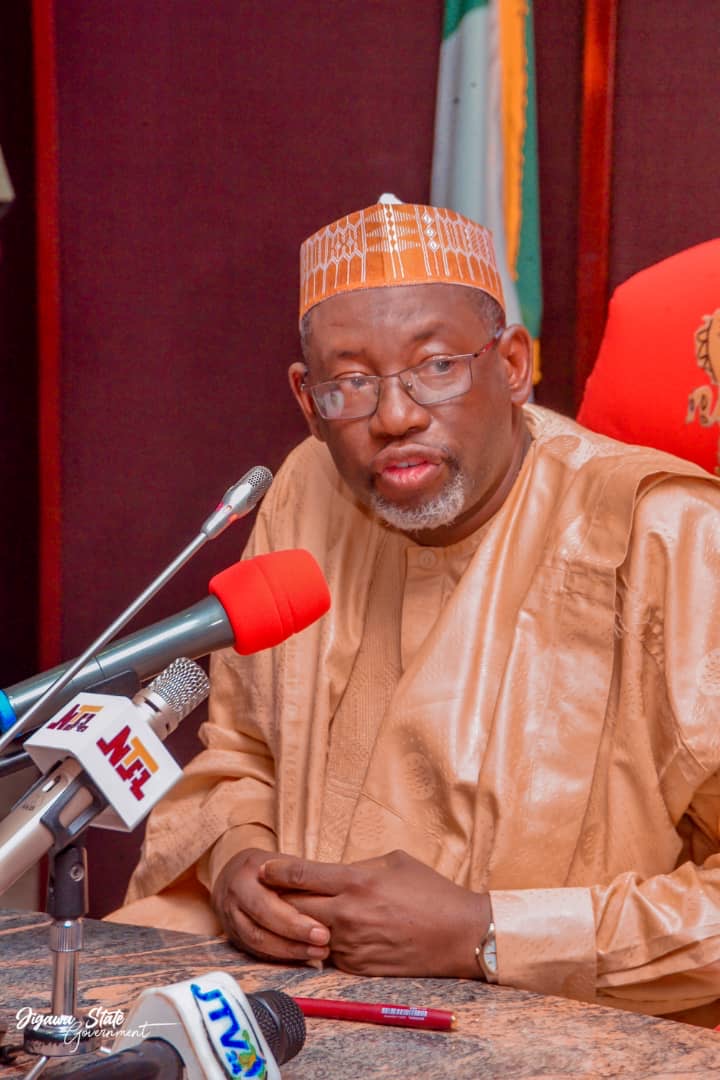By Lamara Garba
In a time when many public officeholders are accused of losing touch with the very people they were elected to serve, Jigawa State Governor, Malam Umar Namadi Danmodi, is charting a different path. Through two innovative engagement platforms—the weekly “Gwamnati da Jama’a” (Government and the People) and the monthly Sectoral Performance Review Meetings—the governor is gradually reshaping the culture of governance in the state by bringing government closer to the grassroots and making public service more transparent and responsive.
The “Gwamnati da Jama’a” program is a weekly interface between the governor and the people of Jigawa. Held in various communities across the state, the program allows ordinary citizens to speak directly to the highest office in the state without protocol or bureaucratic barriers. It is a bold departure from the top-down style of leadership Nigerians are familiar with. In these sessions, citizens lay bare their concerns—whether about road projects, health care delivery, school conditions, or water supply—and the governor listens, takes notes, and often issues directives on the spot.
The scenes are as organic as they are powerful: a widow lamenting the lack of a primary health center in her village; a youth leader raising the issue of unemployment; a farmer pleading for access to improved irrigation. For Governor Namadi, these are not just complaints. They are data. They are the real-time pulse of the state’s development.
“Gwamnati da Jama’a is not a political gimmick,” the governor once remarked during a town hall in Hadejia. “It is governance the way it should be—honest, direct, and accountable.”
The impact of this program is already visible. In the last six months alone, several long-standing issues brought up during the town halls have been resolved. A dilapidated primary school in Guri was rehabilitated. Water boreholes were drilled in remote areas of Birnin Kudu. In Dutse, the state capital, youth empowerment schemes were expanded based on feedback gathered directly from beneficiaries.
Complementing this grassroots outreach is the governor’s monthly Sectoral Review Meeting, where heads of ministries, departments, and agencies (MDAs) present progress reports, explain budget utilization, and face tough scrutiny—not only from the governor but from civil society observers and select representatives of the public. The purpose is clear: to ensure that every commissioner and agency head is not just busy, but effective and accountable.
These sessions are not mere formalities. Governor Namadi runs them like a boardroom meeting in a private-sector setting, demanding timelines, measurable outcomes, and clear deliverables. Ministries are required to show what was planned, what has been done, what challenges they faced, and what the next steps are. Underperforming agencies do not go unchallenged.
One of the most striking outcomes of this system is how it fosters inter-agency collaboration and reduces duplication of efforts. For example, at the April sectoral meeting, the Ministry of Health and the Ministry of Water Resources collaborated to address water contamination issues in some primary health centers—a challenge that had long persisted due to bureaucratic silos. With the sectoral platform, such problems are now tackled holistically.
Both programs have also given the governor a rare advantage in leadership: firsthand information. Unlike governors who rely solely on filtered reports and political briefings, Namadi’s governance model enables him to validate information directly from the source—the people and the performance metrics. This improves decision-making and enhances service delivery.
The feedback loop between the government and the people is now shorter, faster, and more efficient. A mother in Ringim no longer has to wait for years to see change; if her concern is valid and urgent, it can get attention through “Gwamnati da Jama’a.” A commissioner can no longer hide behind vague progress claims; monthly reviews demand results and expose gaps.
More importantly, these initiatives are restoring public trust in government—a rare feat in today’s Nigeria. Jigawa citizens are beginning to feel a sense of ownership over state policies. They now know that their voices matter. The regular public engagements have helped to demystify governance, making it less about power and more about service.
Political analysts are beginning to take note. According to Professor Mainasara Yakubu Kurfi, a public policy expert at Bayero University’s Faculty of Communication , “What Governor Namadi is doing may well become a national model for participatory governance. He’s combining empathy with efficiency, and that’s not something we see often in Nigerian politics.”
Yet, the approach is not without its challenges. The expectations it creates are high. Some communities now demand instant solutions, not realizing that not all problems can be fixed overnight. There is also the risk of politicization, where interest groups may try to hijack the process to push narrow agendas. But for now, the benefits seem to outweigh the risks.
Also speaking, Professor Muhammad Shuaibu Abubakar, a former Dean of the Faculty of Engineering at Bayero University, Kano, he sees the programmes as a consolidation of democratic governance in the state. “For me, these policies will have a direct bearing towards ensuring accountability and efficiency in governance while at the same time making all political appointees in the state up and doing. There would be no room for mediocre nor people who lacks vision and focus.
Indeed, as Jigawa State continues to pursue its development agenda under Governor Namadi’s leadership, the weekly and monthly programs are likely to remain cornerstones of a governance philosophy rooted in accountability, responsiveness, and humility.
It is instructive to conclude that in a democracy where citizens often feel sidelined after elections, Jigawa’s Namadi offers a glimpse of a more inclusive and listening government.
Therefore, if other states—or even the federal government—are paying attention, they may discover in Governor Namadi’s model the blueprint for restoring credibility to leadership: govern not for the people, but with the people.
_Lamara Garba, writes from Kano_


